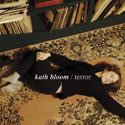Kath Bloom, Terror and Kath Bloom/Loren Connors, Sing the Children Over / Sand In My Shoe
by dave heaton

Kath Bloom has one of those strong voices that can instantly transfix you, or perhaps instantly drive you away, though I’ve only experienced the first. Non-music nerds may know one of her songs from the scene in the film Before Sunrise where our would-be lovers listen to it in a record-listening both at a record store in Vienna. It’s a perfect song for that scene, as her voice pierces straight through everything around us, all of the noise in the world. It puts us in a different state.
In the ‘80s, Bloom collaborated on six limited-edition albums with a guitarist whose playing has a similar piercing quality to those on his wavelength: Loren Connors. He’s a pro at creating a unique atmosphere, which is what he does behind Bloom on these albums, at least on the two that have been reissued by Chapter Music as one CD: 1982’s Sing the Children Over and 1983’s Sand in My Shoe.
Sing the Children Over, originally released on the appropriately titled label Ambiguous, is a blues album, if a moodier, stranger one than that suggests. Connors plays spacey but visceral blues guitar while Bloom sings either moody or direct or both. She sings both originals and traditional blues songs, from Robert Johnson’s “Last Fair Deal” to “Nobody’s Fault But Mine” to an incredible, pained “I’ve Been Working on the Railroad.” These are songs of loneliness, of loss. Her singing on “All My Trials Here” is delicate but strong. “It’s So Hard to Come Home” is reminiscent of the bleakest of Linda and Richard Thompson’s songs together. Even the gospel number “In the Garden” sounds sad.
Sand In My Shoe starts off with Bloom singing in higher registers, but sounding less happy than deranged, at the end of her rope. Her voice gets higher the more upset she is, especially as she desperately asks, “Baby / you’re breaking my heart again / why?”. “Desperation” is a good key word for these songs, all written by Bloom. Desperation and loneliness and longing. Bloom’s voice and Connors’ playing don’t necessarily go together smoothly, instead heightening those feelings. It’s an album of heightened tension that still ends up beautiful. Even when she sings songs of satisfaction and happiness, she sounds just as crazed, as on “You Make My Dreams Come True”.
Jump forward 25 years to today, and Bloom has released a new album, Terror, that follows up 2006’s Finally compilation of previously released songs. Terror feels like less of an experiment than the collaborative albums. It’s on the surface more of a straight singer-songwriter album. Bloom picks up a guitar and harmonica and sings her songs, supported by a few other musicians, giving minimal support. That more direct, ‘everyday’ quality fits the songs, which so often seem to be about everyday life. In simple terms they deal with daily struggles (“Just Can’t Handle It”), with love (“Love Me”), with parenting (“Midnight Moon”), with moving on (“Open Road”), and with the ups and downs of companionship (“You Walk Beside Me”). That “everyday” quality makes Bloom’s voice all the more piercing. The songs cut deep because they don’t feel like exercises or fiction, but hit a human nerve, tap into essential problems and pleasures of daily life. That happens when Bloom sings a sentiment almost ordinary, or at least familiar, something like the love-song lyrics “I’ve waited such a long long time / now it’s coming true.” Her unearthly, yet increasingly rugged voice, tackles a sentiment like that in a way that cuts away the cliché aspect and makes it honest. And then she’ll add to it a thought that takes it beyond that level, to feel like poetry, and then like revelation, like unbarring the secrets around us: “I’ve felt a thousand dreams before / a thousand dreams have died / when I get close to getting what I want / I run and hide.”
I’m not sure that quoting those lyrics really does anything, though, to communicate their impact – it’s all about her singing. How do you pin down a voice so strange, yet so expressive, on paper?
Still, lyrics and melodies – songwriting is a part of it. There’s songs here that feel breezy and fun but contain a world of hurt – “Didn’t Do This to You”. Songs that possess an awe at the world around us, and a horror. And songs that capture a moment, an insight, while the music and Bloom’s singing calmly do the same – “Everything Looks Different at Night”. But even that song takes off partway through, from a late-night observation driven by thoughts of an on-again/off-again relationship, into a confession startlingly tragic. “A friend of mine once told me that you can learn to love / any thing at all,” she sings. “Guess I better learn to love these rocks below this cliff before I fall.” She takes the last syllable of “fall” up and down, while generating the same glowing, hovering feeling of the lines before. Her voice soars and falls at the same time, while she sings of feelings soaring and falling, of lives rising and falling. That’s the album’s first song. It’s a jumping-off a cliff into the realm of human drama, of philosophical questions. But that makes it sound like it’s not beautiful music, not strange music, not fun, and it is all of those too. The essence of it all might be in the last song, “Most Beautiful Day” – “This is not the way I want it to be / not the way I hoped it would be”… but still it’s “the most beautiful day”. That’s life, right? And perhaps the highest praise for Terror is that it feels like all of that disappointment and hope, that optimism and cynicism, is wrapped up in her voice, no matter what she would be singing.
Copyright (c) 2008 erasing clouds |
|